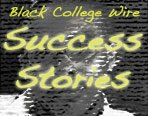| What Holds Africa Back? |  |
 |
 |
| By Charity Jones -- Black College Wire | |
|
While growing up in Kenya, June Arunga was troubled: What has gone wrong in Africa? Why is it so poor? To answer those questions she was forced to answer this one: Where does wealth come from?
Jerry Rogers/Campus Echo
June Arunga
Contrary to many African economists, Arunga, a graduate of the University of Buckingham in Great Britain, does not blame globalization or a lack of resources for Africa’s problems. Arunga argues that legal structures that breed corruption and over regulation are the problem. Arunga says that economic liberalization and free trade will promote African entrepreneurship. “What should be encouraged is the fundamental right of people to own land and the products of their labor, which are then recognized by the courts, and can be exchanged at the market,” said Arunga. Arunga’s economic thinking has been influenced by her documentary work, specifically the 2004 British Broadcasting Corporation production, “The Devil’s Footpath.” The film, which covers a 5,000 mile voyage across the African continent, covers war zones, mining towns, refugee camps, and more. Arunga put her economic concepts into practice when she co-founded Black Star Lines, a banking service and payment network that small vendors can operate from their cell phones. “You have to come with innovative ideas ... not just for your area but worldwide,” said Arunga. In her speech, Arunga discussed the importance of free trade and the value of the American free enterprise system. . According to Arunga when people trade something of value for money, a foundation of economic development is created. Arunga said nations must be open-minded when they view the world because there are “six billion different views of the world.” She said she wanted people to dare to challenge their own thinking. “Make your life count for something, don’t be a clone of other people, dare to challenge your own thinking” she said.
Charity Jones writes for The Campus Echo, the North Carolina Central University student newspaper, which originally published this article.
|
|
| Posted Nov. 27, 2009 |
| < Prev | Next > |
|---|



